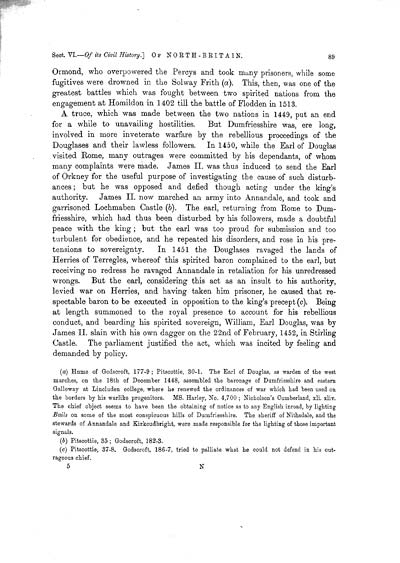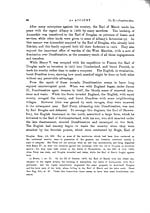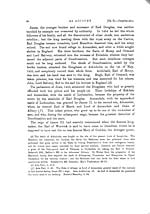Volume 5
(95) Page 89
Download files
Individual page:
Thumbnail gallery: Grid view | List view

89 Ormond, who overpowered the Percys and took many prisoners, while some fugitives were drowned in the Solway Frith (a). This, then, was one of the greatest battles which was fought between two spirited nations from the engagement at Homildon in 1402 till the battle of Flodden in 1513. A truce, which was made between the two nations in 1449, put an end for a while to unavailing hostilities. But Dumfriesshire was, ere long, involved in more inveterate warfare by the rebellious proceedings of the Douglases and their lawless followers. In 1450, while the Earl of Douglas visited Rome, many outrages were committed by his dependants, of whom many complaints were made. James II. was thus induced to send the Earl of Orkney for the useful purpose of investigating the cause of such disturb- ances ; but he was opposed and defied though acting under the king's authority. James II. now marched an army into Annandale, and took and garrisoned Lochmaben Castle (6). The earl, returning from Rome to Dum- friesshire, which had thus been disturbed by his followers, made a doubtful peace with the king; but the earl was too proud for submission and too turbulent for obedience, and he repeated his disorders, and rose in his pre- tensions to sovereignty. In 1451 the Douglases ravaged the lands of Herries of Terregles, whereof this spirited baron complained to the earl, but receiving no redress he ravaged Annandale in retaliation for his unredressed wrongs. But the earl, considering this act as an insult to his authority, levied war on Herries, and having taken him prisoner, he caused that re- spectable baron to be executed in opposition to the king's precept (c). Being at length summoned to the royal presence to account for his rebellious conduct, and bearding his spirited sovereign, William, Earl Douglas, was by James II. slain with his own dagger on the 22nd of February, 1452, in Stirling Castle. The parliament justified the act, which was incited by feeling and demanded by policy. (a) Hume of Godscroft, 177-9 ; Pitscottie, 30-1. The Earl of Douglas, as warden of the west inarches, on the 18th of December 1448, assembled the baronage of Dumfriesshire and eastern Galloway at Lincluden college, where he renewed the ordinances of war which had been used on the borders by his warlike progenitors. MS. Harley, No. 4,700 ; Nicholson's Cumberland, xli. xliv. The chief object seems to have been the obtaining of notice as to any English inroad, by lighting Bails on some of the most conspicuous hills of Dumfriesshire. The sheriff of Nithsdale, and the stewards of Annandale and Kirkcudbright, were made responsible for the lighting of those important signals. (b) Pitscottie, 35 ; Godscroft, 182-3. (c) Pitscottie, 37-8. Godscroft, 186-7, tried to palliate what he could not defend in his out- rageous chief. 5 N
Set display mode to:
![]() Universal Viewer |
Universal Viewer | ![]() Mirador |
Large image | Transcription
Mirador |
Large image | Transcription
Images and transcriptions on this page, including medium image downloads, may be used under the Creative Commons Attribution 4.0 International Licence unless otherwise stated. ![]()
| Caledonia, or, An account, historical and topographic of North Britain from the most ancient to the present times > Volume 5 > (95) Page 89 |
|---|
| Permanent URL | https://digital.nls.uk/74530314 |
|---|---|
| Description | Vol. V. |
|---|---|
| Attribution and copyright: |
|

